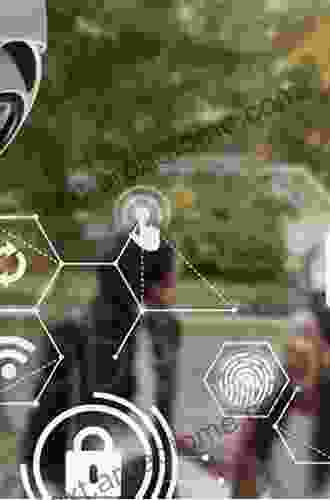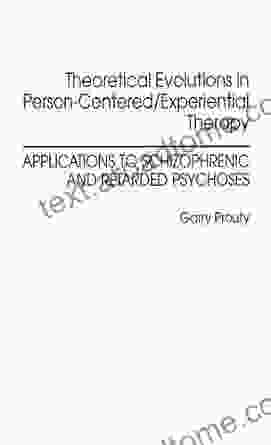Theoretical Evolutions In Person Centered Experiential Therapy

Person-Centered Experiential Therapy (PCET) is a humanistic approach to psychotherapy that focuses on the individual's subjective experience and growth potential. Over the years, PCET has undergone significant theoretical evolutions, expanding its scope and effectiveness.
4.9 out of 5
| Language | : | English |
| File size | : | 1970 KB |
| Text-to-Speech | : | Enabled |
| Word Wise | : | Enabled |
| Print length | : | 144 pages |
| Screen Reader | : | Supported |
Core Principles of PCET
PCET is grounded in the following core principles:
- Client-Centered: PCET places the client at the center of the therapeutic process, recognizing their unique experiences and perspectives.
- Emphasizes Unconditional Positive Regard: The therapist provides a non-judgmental and supportive environment where the client feels safe to explore their thoughts and feelings.
- Focuses on Subjective Experience: PCET prioritizes the client's subjective perceptions rather than objective reality.
- Aims for Personal Growth: The goal of PCET is to empower clients to recognize their strengths, address challenges, and achieve greater self-awareness and fulfillment.
Theoretical Evolutions
As PCET has evolved, several theoretical advancements have enriched its framework:
1. Experiential Focus
In the 1970s, PCET incorporated experiential elements, such as role-playing and imagery, to enhance the client's connection with their emotions and experiences.
2. Intercultural Sensitivity
PCET has expanded to recognize cultural diversity and the influence of social contexts on an individual's experience.
3. Relational Theory
PCET has integrated relational theory, emphasizing the importance of relationships in shaping an individual's self-concept and well-being.
4. Neuroscience and Body-Mind Connection
PCET has incorporated insights from neuroscience and body-centered practices, recognizing the interplay between mind, body, and emotional experiences.
Benefits of PCET
PCET offers numerous benefits for individuals seeking personal growth and well-being:
- Increased Self-Awareness: PCET helps clients gain deeper insights into their thoughts, feelings, and motivations.
- Improved Communication Skills: PCET enhances communication skills by encouraging clients to express themselves authentically.
- Enhanced Coping Mechanisms: Clients develop effective coping strategies to manage challenges and promote emotional resilience.
- Greater Acceptance and Self-Compassion: PCET fosters self-acceptance and compassion, reducing self-criticism.
- Improved Relationships: By understanding their own needs and boundaries, clients can build healthier and more fulfilling relationships.
Theoretical Evolutions In Person Centered Experiential Therapy delves into the latest developments and innovations in PCET, offering a comprehensive guide for therapists, counselors, and individuals seeking personal growth and well-being. Through its client-centered approach, experiential focus, and emphasis on the subjective experience, PCET empowers individuals to unlock their potential and live a more fulfilling life.
4.9 out of 5
| Language | : | English |
| File size | : | 1970 KB |
| Text-to-Speech | : | Enabled |
| Word Wise | : | Enabled |
| Print length | : | 144 pages |
| Screen Reader | : | Supported |
Do you want to contribute by writing guest posts on this blog?
Please contact us and send us a resume of previous articles that you have written.
 Book
Book Novel
Novel Page
Page Chapter
Chapter Text
Text Story
Story Genre
Genre Reader
Reader Library
Library Paperback
Paperback E-book
E-book Magazine
Magazine Newspaper
Newspaper Paragraph
Paragraph Sentence
Sentence Bookmark
Bookmark Shelf
Shelf Glossary
Glossary Bibliography
Bibliography Foreword
Foreword Preface
Preface Synopsis
Synopsis Annotation
Annotation Footnote
Footnote Manuscript
Manuscript Scroll
Scroll Codex
Codex Tome
Tome Bestseller
Bestseller Classics
Classics Library card
Library card Narrative
Narrative Biography
Biography Autobiography
Autobiography Memoir
Memoir Reference
Reference Encyclopedia
Encyclopedia Mercotte
Mercotte Mary Kaye Asperheim
Mary Kaye Asperheim Margot Adler
Margot Adler Mauricio Garita
Mauricio Garita Rachelle Buchbinder
Rachelle Buchbinder Margaret Maggie Honnold
Margaret Maggie Honnold Mary Theresa Tringale
Mary Theresa Tringale Matthew Henry
Matthew Henry Melissa Sprouse Browne
Melissa Sprouse Browne Margaret Horton
Margaret Horton Margaret Wise Brown
Margaret Wise Brown Mary A Languirand Phd
Mary A Languirand Phd Stephanie Coontz
Stephanie Coontz Maria Wiesner
Maria Wiesner Michael R Hathaway
Michael R Hathaway Steven Ascher
Steven Ascher Melissa Gayle West
Melissa Gayle West Will Cook
Will Cook Mark Pilkington
Mark Pilkington Pakn Treger
Pakn Treger
Light bulbAdvertise smarter! Our strategic ad space ensures maximum exposure. Reserve your spot today!
 Charlie ScottFollow ·2.2k
Charlie ScottFollow ·2.2k Quentin PowellFollow ·13k
Quentin PowellFollow ·13k Cason CoxFollow ·13.3k
Cason CoxFollow ·13.3k Douglas PowellFollow ·4.4k
Douglas PowellFollow ·4.4k Kevin TurnerFollow ·4.8k
Kevin TurnerFollow ·4.8k Hugh BellFollow ·18.6k
Hugh BellFollow ·18.6k Roy BellFollow ·19k
Roy BellFollow ·19k Joshua ReedFollow ·7.8k
Joshua ReedFollow ·7.8k

 Ralph Ellison
Ralph EllisonIntelligent Video Surveillance Systems: The Ultimate...
In a world...

 Jeffrey Cox
Jeffrey CoxThe Origins of the Modern World: A Journey to the Roots...
Embark on an Extraordinary...

 Paulo Coelho
Paulo CoelhoUnlock the Power of Integrated Medical Imaging with...
In the rapidly evolving...

 Charles Reed
Charles ReedThe Christ of the Covenants: Unlocking the Mystery of...
Embark on a Profound...

 Elton Hayes
Elton HayesComputational Hydraulics: A Comprehensive Guide for...
In the realm of fluid dynamics,...
4.9 out of 5
| Language | : | English |
| File size | : | 1970 KB |
| Text-to-Speech | : | Enabled |
| Word Wise | : | Enabled |
| Print length | : | 144 pages |
| Screen Reader | : | Supported |














